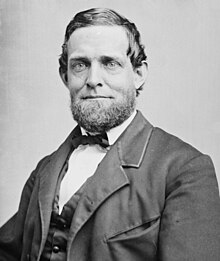Schuyler Colfax
| Schuyler Colfax | |
|---|---|
 |
|
| 17th Vice President of the United States | |
|
In office March 4, 1869 – March 4, 1873 |
|
| President | Ulysses S. Grant |
| Preceded by | Andrew Johnson |
| Succeeded by | Henry Wilson |
| 25th Speaker of the U.S. House of Representatives | |
|
In office December 7, 1863 – March 3, 1869 |
|
| President |
Abraham Lincoln Andrew Johnson |
| Preceded by | Galusha A. Grow |
| Succeeded by | Theodore M. Pomeroy |
| Member of U.S. House of Representatives from Indiana's 9th district |
|
|
In office March 4, 1855 – March 3, 1869 |
|
| Preceded by | Norman Eddy |
| Succeeded by | John P. C. Shanks |
| Personal details | |
| Born |
Schuyler Colfax Jr. March 23, 1823 New York City, New York |
| Died |
January 13, 1885 (aged 61) Mankato, Minnesota |
| Political party | Republican (After 1855) |
| Other political affiliations |
Whig (before 1854) Indiana People's Party (1854) |
| Spouse(s) | Evelyn Clark Colfax Ellen Maria Wade Colfax |
| Children | Schuyler Colfax III |
| Signature | |
Schuyler Colfax Jr. (/ˈskaɪlər ˈkoʊlfæks/; March 23, 1823 – January 13, 1885) was a journalist, businessman, and politician from Indiana. He served as a United States Representative (1855–69), Speaker of the House of Representatives (1863–69), and the 17th Vice President of the United States (1869–73). To date, he is one of only two Americans (John Nance Garner is the other) to have served as both House speaker and vice president.
Colfax was known for his opposition to slavery while serving in Congress, and was a founder of the Republican Party. In January 1865, as Speaker of the House, Colfax made the unusual choice to cast a vote for passage of the Thirteenth Amendment. (Speakers can vote on House motions but, by convention, rarely do so.) After winning the presidential election of 1868, Ulysses S. Grant and Colfax, at ages 46 and 45, were the youngest Presidential ticket elected in the 19th Century. Believing Grant would only serve one term, in 1870 Colfax attempted unsuccessfully to garner support for the 1872 presidential nomination by telling friends and supporters he would not seek a second vice-presidential term. Grant ran again, and Colfax reversed himself and attempted to win the vice presidential nomination, but was defeated by Henry Wilson. In January 1871, Colfax encouraged a unified Italy to adopt a republican government that protected religious freedom and civil rights of its citizens.
An 1873 Congressional investigation into the Crédit Mobilier scandal named Colfax as one of the members of Congress (mostly Republicans) who were offered (and possibly took) payments of cash and discounted stock from the Union Pacific Railroad in exchange for favorable action during the construction of the First Transcontinental Railroad. Colfax left the vice presidency at the end of his term in 1873 and never again ran for office. Afterwards he worked as a business executive and became a popular lecturer and speech maker.
...
Wikipedia
